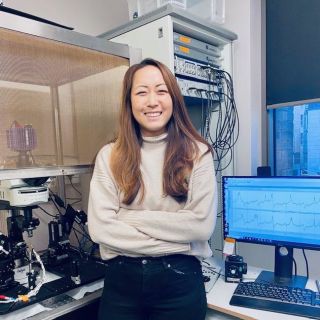 Dr Annie Park has been awarded a Wellcome Early-Career Award, a Wellcome Trust scheme for early-career researchers who are ready to develop their research identity and deliver shifts in understanding that could improve human life, health and wellbeing.
Dr Annie Park has been awarded a Wellcome Early-Career Award, a Wellcome Trust scheme for early-career researchers who are ready to develop their research identity and deliver shifts in understanding that could improve human life, health and wellbeing.
Dr Park will pursue a 5-year research project entitled “Experience-dependent plasticity of dopaminergic neurons facilitates reward-specific signalling" in the Waddell Group based at the Centre for Neural Circuits and Behaviour. She is working in collaboration with Professor Stephen Goodwin, also at the CNCB, Dr Christoph Treiber, who is soon to start a group in the University of Oxford's Department of Biology, and Dr Lisa Fenk from the Max Planck Institute for Biological Intelligence.
Dr Park investigates the key role that dopamine-releasing neurons play in encoding reward in the brain from mammals to insects. She says: "Not all dopamine neurons respond the same way to the experience of reward, and some do not respond at all. It is becoming increasingly apparent that specific classes of dopamine neurons are likely to be tuned to different types of reward, for example sugar vs. sex.
"Recent progress in nucleotide sequencing and whole-brain electron microscopy have provided a means to generate gene expression profiles for every neuron, and to understand how they are connected together in neural wiring diagrams (or connectomes).
"Applying these technologies to the dopaminergic system has revealed remarkable cellular heterogeneity on a molecular and neural circuit level. However, it remains unknown how these wiring and molecular differences correspond to the physiology of different types of dopamine neurons, and how dopamine neuron diversity contributes to reward-specific responses.
"Discoveries made from my work will provide a generalisable mechanistic understanding of how the brain encodes reward. This will eventually allow us to better understand disease states in which reward seeking is dysregulated, such as addiction or depression."

